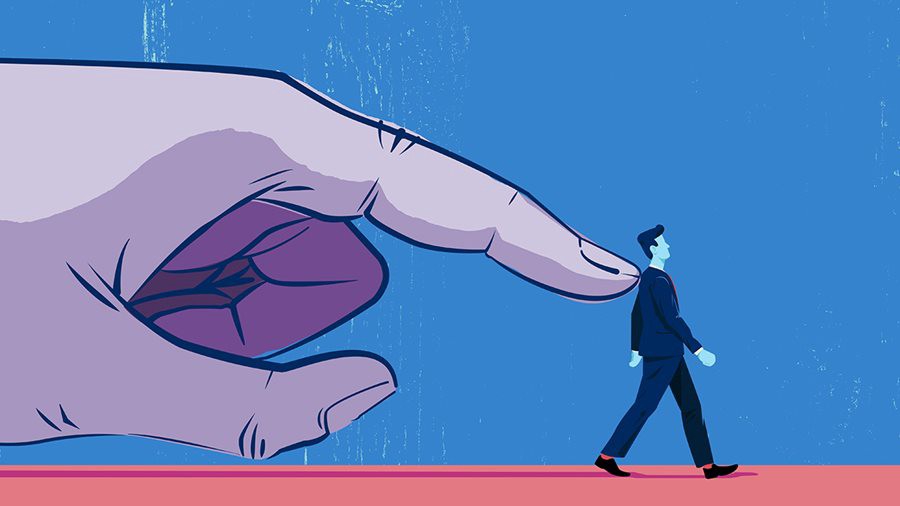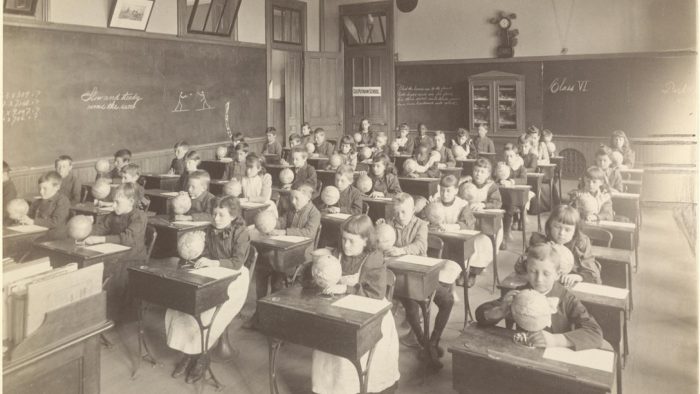The way out is through accountability.
Crackpot Corporatism is Killing the Academy

The University of Tulsa is a case study in the depredations of disruptive innovation in higher education.
Higher education is undeniably in crisis. Even as the inflation-adjusted price of a four-year degree doubled between 1989 and 2016 (in no small part because of administrative bloat), college graduates registered alarmingly low levels of literacy, numeracy, and civic and historical knowledge. Forty percent of graduates were recently found to lack the reasoning skills required for white-collar work. Offering an inferior product at skyrocketing prices is a poor business plan. What would a good one look like?
In general, college and university boards, where C-level executives far outnumber scholars and teachers, haven’t a clue how to answer this question. Turning for advice to the people who speak their language—data-analytics, managerial, and marketing “experts” at higher education consulting firms, where business is booming—trustees and administrators are buying into “disruptive innovation” and “competency-based education.” They are slashing the liberal arts, investing heavily in technical and vocational programs tailored to the perceived needs of the local and regional economy (something in which many trustees have a special interest), and hiring hordes of student success, academic, career, and financial coaches who will channel undergraduates toward preferred “outcomes.” This shift to pre-professional training and “wraparound” student services coincides with an increased emphasis on “experiential learning” as opposed to classroom study, and on service to the institution and the wider community as opposed to research and teaching.
Such top-down changes, which inevitably involve structural reorganizations that strengthen administrators and weaken faculty, are transforming higher education in radical ways—and not for the better. Non-profit colleges and universities are effectively being corporatized and folded into the for-profit economy. And as more and more schools abandon the humanities and the natural sciences, divert resources to job-training programs, and forsake traditional academic models and practices, the institution of the university—for many centuries the primary vehicle for the preservation, cultivation, and transmission of core human knowledge—is fast approaching total collapse.
Cut Off at the Roots
Healthy organizations are generally not susceptible to hostile takeovers, but higher education has long suffered from self-inflicted wounds. A liberal education is—or was—a “tree of Life,” in H.J. Massingham’s words, “whose roots went deep into earth and whose top was in heaven.” “The history of modern education may be the history of the loss of this image,” Wendell Berry wrote in his 1984 essay “The Loss of the University.” Built on “the pattern of the industrial machine,” the contemporary academy “resembles a loose collection of lopped branches waving about randomly in the air.”
It’s hard to argue with Berry’s assessment. Today’s students must look long and hard for programs that will connect them with the historical and intellectual roots of our culture, and even of particular disciplines. Western Civilization courses disappeared from campus decades ago. The number of students who study Hebrew, Greek, or Latin, the foundational languages of the tradition, is miniscule. English majors at most elite universities and colleges are no longer required to study Shakespeare. Few economics majors read Aristotle on wealth, Smith on the division of labor, or even Marx’s discussion of fourfold alienation. The vast majority of graduates in political science have, at best, a passing acquaintance with Plato, Machiavelli, or Hobbes.
One could go on, but that’s not the worst of it. In recent years, even the lopped-off branches of the humanities and social sciences have not been unmolested. In fact, they’ve been pulped: fed through a wood chipper of critical studies and dissolved in the conceptual acid of race, class, gender, and “structural oppression”—the abstract categories of “intersectional” analysis that have invaded every part of the academy and have now colonized the public sphere, dividing and sickening the body politic. Fluency in what Berry calls the “common tongue” that for millennia had formed “responsible heirs and members of culture” is rare in the professoriate, and is as likely as not to arouse suspicion among colleagues and deans. Little wonder that most faculty and virtually all administrators seem to have forgotten, to quote Berry again, that “the thing being made in a university is humanity.”
The Life-Giving Tradition
Some readers will probably be indifferent to the changes I’ve described. Some conservatives may actually be inclined to push what is falling: if universities are no longer teaching the tradition, let them perish—and anyway, what’s wrong with job training? Liberals, meanwhile, may welcome programs that teach marketable skills to recent immigrants and other marginalized groups, even at the cost of a liberal education.
But perhaps we should consider what Berry means when he speaks of “humanity.” The biblical and philosophical traditions of Jerusalem, Athens, and Rome sing in unison: the good is both transcendent and immanent. It is, to begin with, the constitutive origin of the world—call it God or the Good—to which all living things aspire or are magnetically attracted. Living beings, however, achieve goodness in flourishing. The concrete process of actualizing individual potentialities, and thus coming to be fully what one is, occurs automatically in birds and lilies. For human beings it must be freely chosen. Human goodness—humanity—inheres in richly developed selves and lives well lived.
Liberal education is an education in freedom. It unchains us from the tyranny of thoughtlessness and fear, of low expectations and narrow horizons. It opens us to the vastness of nature and human achievement, teaches us to see the whole of things, and makes us capable of thinking and acting in a broad variety of contexts and situations. It gives us rich and varied models of nobility and excellence to excite our ardor and order our souls. Perhaps most important, it trains us to stand on our own feet—to think and judge and act for ourselves—and so to find goodness and meaning in our lives.
Salvador Dalí taught the paradox that “Everything that is not tradition is plagiarism,” because only art nourished by the “blood of reality,” by the essential accumulation of richly oxygenated life that circulates in the tradition, can be truly original. The life-giving tradition gives its gifts indiscriminately to all, and I would suggest that a liberal education is especially important for poor and disadvantaged students. Jonathan Rose’s “The Classics in the Slums” includes testimonia from early twentieth-century English colliers and laundresses “kindled to the point of explosion” by volumes of poetry, literature, and history borrowed from the libraries of the Workers’ Educational Association. Richard Wright remarks in Black Boy that books taught him how to “wring a meaning out of meaningless suffering” and filled him with “nothing less than a sense of life itself” as he labored to leave the Jim Crow South. “Across the color line,” W.E.B. Du Bois writes in The Souls of Black Folk, “I move arm in arm with Balzac and Dumas…I summon Aristotle and Aurelius and what soul I will, and they come all graciously with no scorn nor condescension.” Liberal education is an essential precondition of equality.
The Case of Tulsa
The top administrators at the University of Tulsa (known colloquially as TU), where I’ve enjoyed fine colleagues and eager students for three decades, claim to be deeply committed to equality and social justice. This is typical: the poison pill of academic corporatism is inevitably sweetened with a coating of compassionate leftism. But the academic reorganization they have engineered in fact amplifies social and economic inequalities: while the few attend elite, highly expensive colleges and universities, the many—their future employees—are channeled into narrow sorts of vocational training. In this and other respects, TU offers a case study in the depredations of disruptive innovation in higher education.
In a slick, highly orchestrated rollout on April 11th, Provost Janet Levit announced the elimination of forty percent of TU’s academic programs. Theater, dance, and vocal and instrumental performance were terminated. Basic languages of the tradition—Greek, Latin, Chinese, German, French, and Russian—were cut, along with the precious wisdom preserved and developed in these venerable tongues. Undergraduate majors in philosophy and religion were eradicated, as were graduate programs in history and anthropology. The natural sciences were also gutted: programs in mathematics, physics, chemistry, biochemistry, geology, and geosciences were eliminated. All academic departments—and with them centuries-old disciplinary structures—are furthermore slated to be phased out. Atomized faculty will be poured into new divisions, including one called “Humanities and Social Justice.”
The liberal arts have recently been slashed at other institutions. But TU is the first top-100 research university, and the first with an endowment of over $1 billion, to have experienced the kind of hostile corporate takeover I described earlier. We certainly won’t be the last, because big endowments make rich targets. “Competency-based education” feeds graduates into the local and regional economy; once a university is redesigned on that model, endowment funds that are run through the institution will enrich those who have deliberately crafted the reorganization in such a way as to serve their corporate interests. In the case of TU, that would be our trustees and top administrators—whose unusually close ties and overlapping interests, centered on the George Kaiser Family Foundation and the Bank of Oklahoma, I sketched in an article for City Journal. (That article, and another I wrote for the James G. Martin Center, detail the underhanded methods by which our administration pushed through its radical restructuring and the smashmouth tactics it has employed to stifle faculty opposition.)
Billionaire George Kaiser is the controlling shareholder of the Bank of Oklahoma, which is the sole trustee of TU’s $1.1 billion endowment. TU President Gerry Clancy, who sits on the bank’s board of directors, recently told the Tulsa World about plans for a “Tulsa Enterprise for Cyber Innovation, Talent and Entrepreneurship, which will allow industry, federal agencies and TU to work together to defend information systems.” The plan would involve the construction of “four cyber centers of excellence: an engineering research center, a multifederal agency cybersecurity center for excellence, a cybersecurity insurance institute and a consortium of business sectors.” These will doubtless be paid for, at least in part, by infusions of cash from the endowment. Unsurprisingly, Kaiser is already pouring millions into linking his program with TU’s new “Professional Super College” (an amalgam of the previously independent colleges of business, law, and health sciences).
Clancy announced in 2018 that TU would henceforth focus on recruiting first-generation college students. (Never mind that such students are highly unlikely to apply to a school that will charge $41,698 in tuition next year.) This supposed commitment to marginalized groups is particularly cynical, given that it is designed to win support for changes that will deprive all TU students of a liberal education—treating them not as ends in themselves who should be allowed to grow and ripen into independent, well-rounded individuals, but as a means to enrich Tulsa’s most wealthy and powerful citizens.
The Banality of Academic Corporatism
Seventy years ago, the philosopher Josef Pieper noted the “total claim of the world of work” in modern life. The demand that teaching and learning be judged exclusively by the criterion of “social service,” or contribution to “the functional nexus of the modern body social,” is a special case of that total claim—and totalizing impulses always express themselves in crude, decayed language. The TU restructuring is called “True Commitment,” and our equally meaningless new slogan is “True Blue, True You.” Prospective students are told that TU will help them realize their “unlimited potential” (an oxymoron, as potential is always relative to some bounded actuality). Faculty now gather once a semester on “Continuous Improvement Day”—a phrase seemingly plucked from Nineteen Eighty-Four—to document the “measurable results” of their pedagogy. It’s all utterly insipid marketing. Remove the packaging and one will find something like the empty box that Theranos touted as a revolutionary medical device.
Academic corporatism is coming soon to a university near you. But our tribulations come with a silver lining. Faculty across the political spectrum have joined in a strong defense of the liberal arts. My closest allies in the fight against our academic overlords are a Marxist economist and a leftist professor of theater. Professors, students, and alumni have discovered common ground that may yet yield a new growth of liberal education. Perhaps we shall fail to save our precious community of teaching and learning. Even so, we may hope that our example will help others to save theirs.
The American Mind presents a range of perspectives. Views are writers’ own and do not necessarily represent those of The Claremont Institute.
The American Mind is a publication of the Claremont Institute, a non-profit 501(c)(3) organization, dedicated to restoring the principles of the American Founding to their rightful, preeminent authority in our national life. Interested in supporting our work? Gifts to the Claremont Institute are tax-deductible.
The federal government is poorly positioned to solve our national problems.
K-12 is the key to reforming education in America.
Practical solutions for one of the country's biggest problems.




